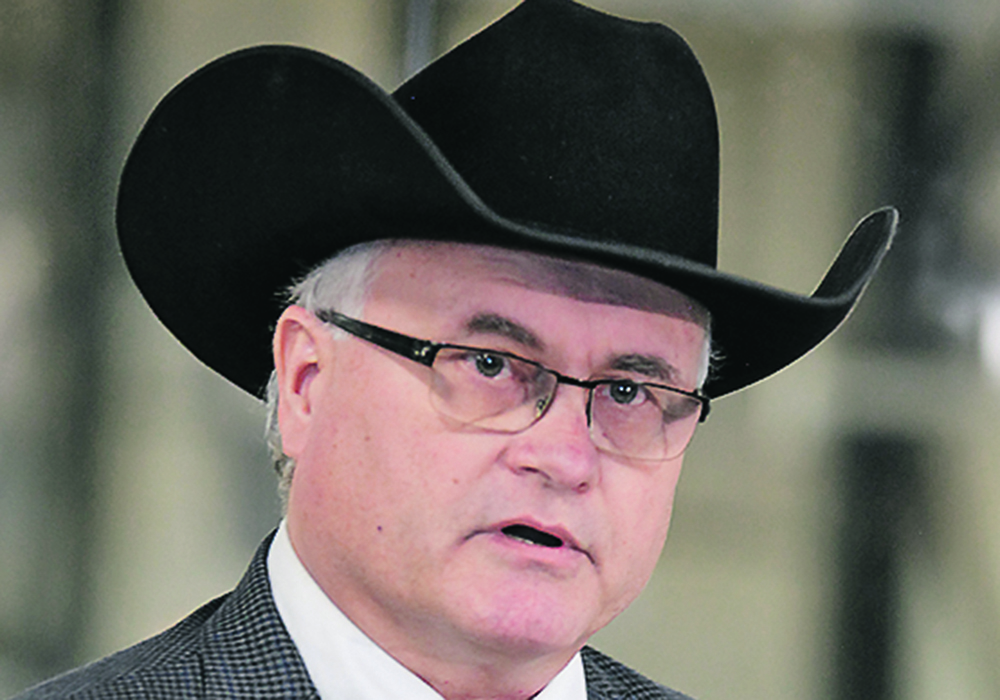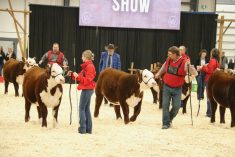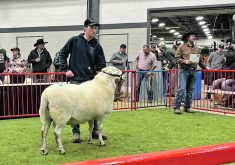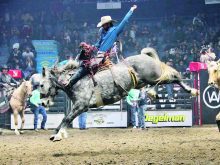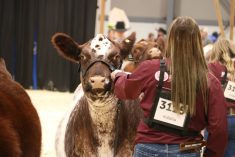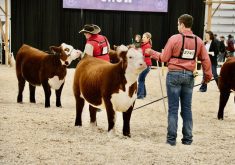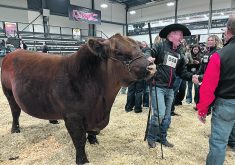Bruce Holmquist, who was inducted into the Simmental association’s hall of fame, says the breed has a lot going for it
The Canadian Simmental Association Hall of Fame has inducted long-time producer, board member and current general manager Bruce Holmquist.
The presentation was made at Canadian Western Agribition, where Holmquist is past president.
“I’ve been really privileged to see the industry from a lot of different sides,” he said.
Holmquist began as a Simmental breeder at the age of 15, served on the Saskatchewan and national boards and joined the CSA staff in 2007. That’s the same year he joined the Agribition board.
“The thing I worked at over my purebred or seedstock career is trying to bring balance to the industry,” he said. “It’s not about a breed of cattle but doing what’s right for the industry on a broad scope. It’s nice to get recognized for that by your peers.”
Read Also
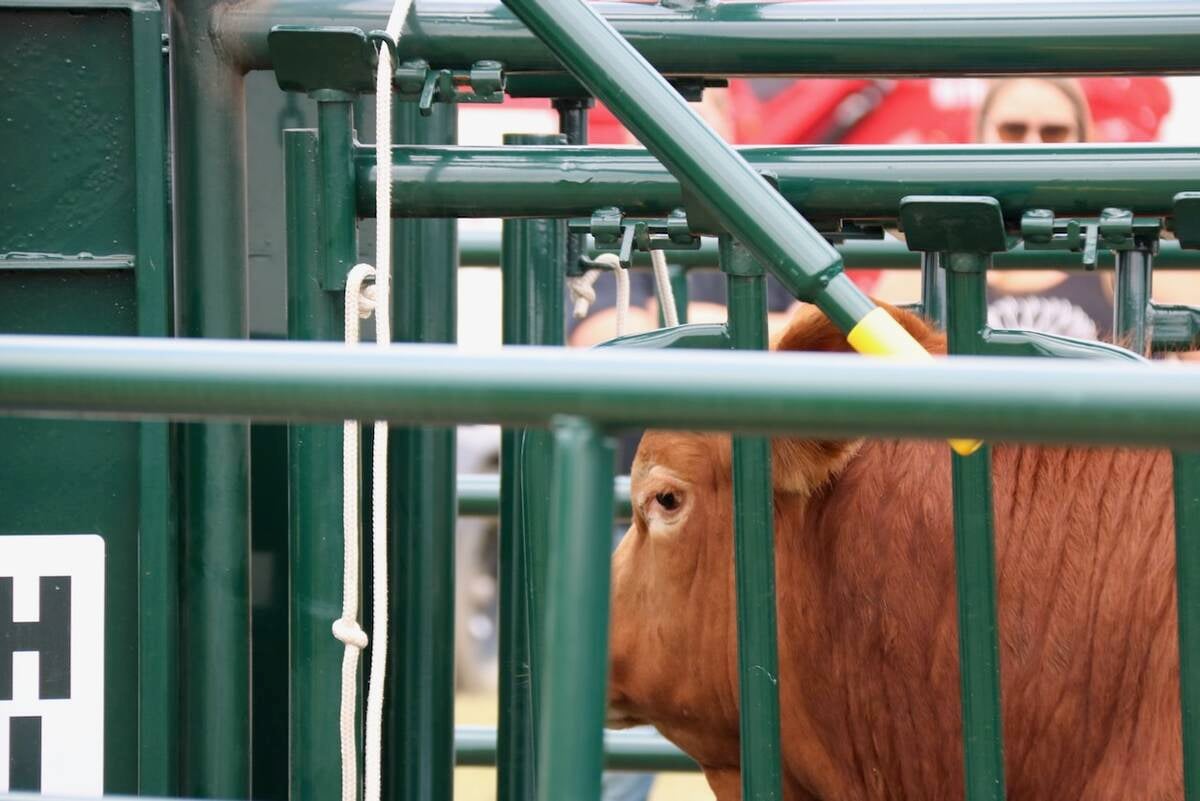
Good handling equipment a must on cattle operations
It’s important for the safety of producers and everyone else dealing with their stock that handling equipment is functional and safe.
Although Holmquist spends a lot of time on the road, he still owns a breeding herd of 40 cows. His daughter and son-in-law look after them as part of their operation. He said that allows him to spend time with his grandchildren and past customers who have bought bulls from the family for more than 40 years.
He said there have been huge changes in the Simmental breed over the years and he feels good about where they are today.
“We were off path for a long time in the ’80s, ’90s, just like a lot of other breeds. We got too much frame and too high maintenance cattle,” he said. “Now we’ve taken them back, we’ve made them more commercially appealing. Some of that’s due to the colour change and I won’t make apologies for that. We’ve got to make money and be efficient and do the best job for the commercial sector and get it on the consumers’ plate.”
Holmquist also said Simmentals have gone from being on buyers’ do-not-buy lists to being the second most used breed of beef cattle in Canada.
Still, he said the cattle industry should be concerned about the declining Canadian cow herd.
“I’ve got a few years left in me and that’s going to be part of my mission and focus is to work for the industry in that regard,” Holmquist said.
Prices for purebreds reflect solid interest and optimism in the sector but that has to connect with the commercial side, he added.
At Agribition, the Simmental sale averaged around $9,000, with the high-selling lot of a pick of two heifers going for $42,000. The heifer calf was consigned by Horner Cattle Co. of Minnedosa, Man., and sold to Longview Cattle Co. from Grenfell, Sask.
In the show ring, Mader Ranches of Carstairs, Alta., showed the grand champion female, Mader Lady 50G with calf at side Mader the Revenant 19J. Additional owners are Ultra Livestock and JK Fraser Cattle.
Ty-D’s Elegance 25H, from Ty-D Livestock at Streamstown, Alta., won the reserve.
The grand champion bull, LLW Card True North G71, came from Wheatland Cattle Co. of Bienfait, Sask., and Semex.
The reserve bull champion was Black Gold Ava’s Scream 102J from Black Gold Simmentals at Lloydminster, Sask.
Randy Noble operates Black Gold with his family. He said they had a good fall show circuit, attending events in Alberta and Saskatchewan including Farmfair in Edmonton and wrapping up at Agribition.
“It is certainly the Grey Cup of the showing season,” he said.
In addition to the reserve bull title, Black Gold was named premier exhibitor and breeder at the show. A heifer calf, Black Gold Ms Soda Pop 134J, was the senior division female champion.
Another bull, Black Gold Coliseum 140H, won at both the Olds Fall Classic and Lloydminster Stockade Round-up, to make it into Agribition’s Beef Supreme show.
Noble said they enjoy showing cattle mostly because of the people they meet. They started in the business in the early 1980s and dispersed the cow herd in 2002 because of drought.
“We started back up again as the next generation, our sons, became involved and were very interested in purebred cattle,” he said. “That motivated us to get going again and now we calve out about 280 head of cows.”
Since re-establishing about 10 years ago, they find themselves again affected by drought, but Noble said carryover from previous years and some feed this year will hopefully get them through the winter.
“Certainly, the good weather this fall has helped us immensely because we still have our cow herd out grazing so that has helped us a lot. Everybody’s kind of in the same boat. We’ll figure out how to get through this year and sure hope things are better next year.”


